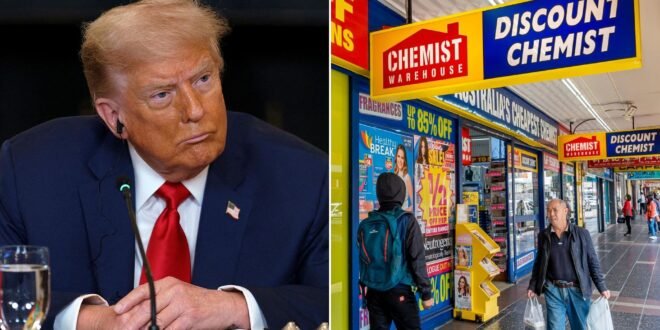The Impact of Trump’s Threat on Australia’s Pharmaceutical Industry
Donald Trump has raised the stakes for Australia by threatening to impose a 200% tariff on pharmaceutical exports to the United States unless significant changes are made to the country’s medicinal subsidy system. This move has created a potential financial burden for Australian consumers, especially those with chronic health conditions or cancer, who rely on affordable medications.
The initial 90-day pause on tariffs was set to expire on July 9 but has now been extended to August 1. However, this extension comes with a warning from Trump that American drug companies may face heavy import taxes if they do not shift their production to the United States. He stated, “We’ll give them a certain period of time to get their act together,” suggesting a one- to one-and-a-half-year window for compliance.
The Role of the Pharmaceutical Benefits Scheme (PBS)
Australia’s Pharmaceutical Benefits Scheme (PBS) has long been a point of contention with American pharmaceutical companies. The PBS allows Australians to access prescription medicines at significantly reduced prices by setting limits on what wholesalers can charge. This system enables the sick and elderly to purchase essential medications affordably.
Despite the pressure from U.S. drug companies, neither major political party in Australia is likely to support scrapping the PBS. The scheme, established in 1953, is seen as a vital component of the country’s healthcare system. Labor, which won a recent election, plans to cap PBS-subsidized medicines at $25 per script, down from the current $31.60. Abandoning such subsidies could leave patients with chronic illnesses or cancer facing substantial out-of-pocket costs.
Specific Examples of Medication Costs
Several key medications highlight the impact of the PBS. For instance:
- Multiple Sclerosis drug Fingolimod (500 micrograms): Actual cost is $1,062.59, with a government subsidy of $1,030.99.
- Prostate Cancer drug Goserelin (50 milligrams): Actual cost is $412.39, with a government subsidy of $380.79.
- Chronic Myeloid Leukaemia drug Imatinib (400 milligrams): Actual cost is $662.67, with a government subsidy of $631.07.
These subsidies make life-saving treatments accessible to concession cardholders, reducing the cost to just $7.70 for Fingolimod, compared to the original $1,031.
Political Reactions and Trade Concerns
Kevin Hogan, the Coalition’s shadow trade minister, emphasized that the Opposition would not support any changes to the PBS to avoid tariffs. He stressed, “National interest and sovereignty first,” referencing the protection of the PBS within the Australia-United States Free Trade Agreement.
Hogan also criticized Prime Minister Anthony Albanese for not securing an in-person meeting with Trump, unlike UK Labour leader Keir Starmer, who managed to reduce steel and aluminium tariffs. Hogan said, “There’s a real question mark that has to be asked over the Prime Minister and his unwillingness or inability to get a one-on-one meeting with the US President.”
Economic Implications
Pharmaceutical products were Australia’s third-largest export last year, valued at $2.1 billion. These exports accounted for 8.6% of all goods sent to the U.S. Imposing tariffs on these products could have severe economic consequences, as they are more profitable than steel and aluminium, which currently face a 50% tariff.
Andrew Hauser, deputy governor of the Reserve Bank of Australia, expressed concern over the unpredictability of Trump’s policies. He noted that the uncertainty surrounding tariffs poses a challenge for global economies, adding, “We’re all watching this like hawks—meaning globally, central banks—because the situation’s evolving very rapidly.”
Conclusion
The potential imposition of 200% tariffs on Australian pharmaceutical exports highlights the complex relationship between trade and healthcare policy. While the U.S. seeks to protect its domestic industry, Australia faces the risk of increased costs for essential medications. The outcome of this dispute will have far-reaching implications for both countries’ economies and public health systems.
 Info Malang Raya Its All About World News
Info Malang Raya Its All About World News




